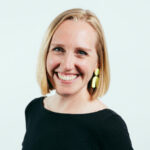Ethnographers are pathmakers by nature, but navigating the job market and other work transitions can be grueling and isolating. How can design and ethnographic methods, community building, and personal practices help sustain us?
EPIC member, design researcher, and career coach Sarah Malin has some strategies to share with you: she’s co-facilitating our next Career Pathmaking Meetup on April 4: Job Search Resilience: A Career Support Event for Ethnographers, Researchers, and Strategists. In anticipation, we chatted with Sarah about how to make the job search less soul-sucking, how ethnography informs her work, and the power of a good question.
For many, searching for a job can be isolating, draining, and demoralizing. What is the role of community in the job search process? How can we make it more human—and community—centered?
I think what exacerbates the pain of the job search (especially in the US) is how simplistically we define community. The concept has been reduced to the nuclear family and coworkers. What if we reframe job searches as moments to enrich and expand our definition? It’s a great time to build relationships with others in our field (which is why I encourage job search peer groups and networking!) and it’s a great time to connect with folks completely unrelated to work. What if we always felt supported by and useful to others, whether in a job or not?
How has anthropology shaped your approach to understanding people, relationships, and work?
Anthropology showed me how thoroughly we’re social creatures. Try as we might to be the star employee, the all-powerful CEO, the best candidate, we’re hopeless without others. And I also need to give a separate shout-out to ethnography because it taught me the difference between participation, observation and reflexivity…all crucial skills that transferred seamlessly from research to leadership and coaching.
How do you apply design thinking to your practice?
Design thinking shows up in overt ways like creating career journey maps, outlining networking personas, getting to the core need, brainstorming and using Miro. And it’s also the backdrop to my practice, or the culture within which many of my clients work. So we reflect on the cultural values and expectations of the industry and then step back so the client can be more intentional about which of those they want to take on as their own versus which of those they want to shed.
You’ve worked as a design researcher and ethnographer for much of your career. Now, as a career transitions coach, you “help clients recraft their stories and design and energize their livelihoods.” Can you tell us more about what this looks like?
It was a natural evolution from interviewing and synthesizing to coaching! Through a series of one-on-one sessions, I help clients process emotions, move past unproductive patterns and develop a confident voice in the midst of change. I also help organizations invest in their emerging leaders by coaching them through developing their leadership style, setting healthy boundaries and communicating effectively. I believe that the coach-client relationship creates the safety needed to nurture healthier habits for work and collaboration.
In your biography, you mention believing in the power of a good question. What are the characteristics of a good question, and how can questions drive change?
A good question is one where the recipient is provoked to think in a way they hadn’t before, but also, crucially, where the recipient feels understood and respected by the question asker. There’s comfort, and therefore growth. So a good question is essentially a relationship. It’s transformative because it solidifies trust and facilitates co-learning.
What do you hope participants will gain from your EPIC Talk?
I hope participants feel less alone in their job search emotions and find ways that they’re more in control of their experience than they think!
Featured image: Photo by Aleksandr Barsukov on Unsplash


0 Comments